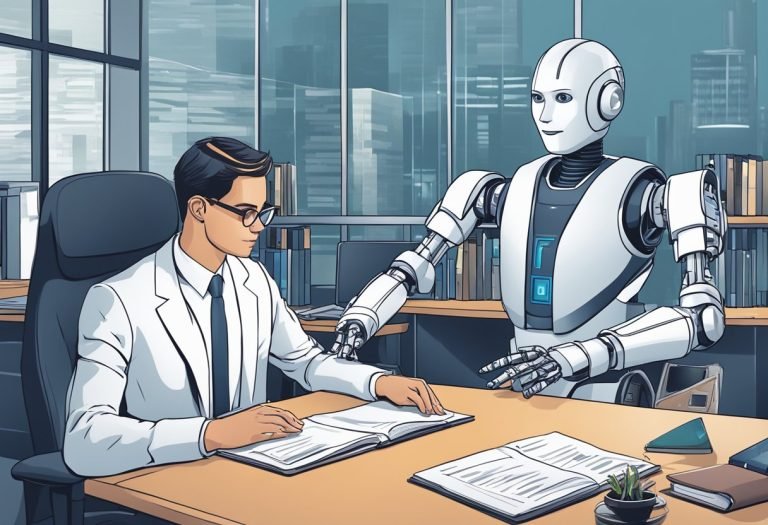Will AI Replace Writers: Examining the Future of Creativity
The rise of artificial intelligence in creative fields has sparked a vibrant debate about whether technology will supplant human writers. Despite AI’s growing capabilities, it is unlikely to fully replace writers. Instead, the integration of AI into writing processes suggests a future where collaboration between human creativity and machine efficiency becomes the norm.

AI has advanced significantly, especially in generating text quickly and accurately. Yet, it often lacks the nuanced understanding of human emotions and cultural context that are critical in creating content that resonates deeply. This limitation underscores the continuing need for human writers who can craft stories and messages that truly connect with readers.
As the conversation about AI’s role in writing continues, the focus is shifting toward how technology can enhance human writing rather than replace it entirely. Many in the industry foresee a symbiotic relationship where AI tools assist writers by handling repetitive tasks, allowing them to focus on more creative and strategic endeavors.
Key Takeaways
- AI is unlikely to replace writers completely.
- AI tools can enhance writing by managing repetitive tasks.
- Human creativity remains essential for meaningful content.
Current State of AI in Writing

AI writing tools have made significant progress with natural language generation, showing abilities in text creation comparable to human writing. These advancements find applications in various industries, such as marketing and journalism.
Technological Advances in Natural Language Generation
AI language models, like GPT-4, have achieved remarkable capabilities. They can produce coherent stories, complete complex narratives, and format screenplays. These models analyze vast amounts of text data to understand linguistic patterns, enabling them to generate text that is not only grammatically correct but also contextually relevant.
AI-generated writing tools have come a long way from their early stages, evolving from simple sentence construction to more sophisticated tasks. This progression opens up new possibilities for content creation, pushing the boundaries of what machines can achieve in writing.
Comparison of AI Writing to Human Writing
AI and human writing have distinct differences, with AI excelling in speed and consistency. While AI can rapidly generate large volumes of text, human writers bring creativity, emotional depth, and nuanced understanding to their work. AI models struggle with capturing the subtleties of human expressions and cultural contexts, often relying heavily on the data they have been trained on.
Despite advances, humans remain superior in producing works that require intricate emotional insights or unique creative touches. Concerns regarding AI potentially replacing human writers persist, yet the capabilities are still complementary rather than competitive in many contexts.
Industries and Applications Utilizing AI Writing
AI writing is becoming increasingly prevalent across diverse sectors. In marketing, it is used to craft personalized email campaigns and generate social media content efficiently. The journalism industry employs AI to draft data-driven reports and make initial news write-ups, although human oversight remains crucial for accuracy.
The entertainment sector applies AI for scriptwriting, creating drafts that human writers can then refine. These uses showcase how AI is integrated to improve efficiency and productivity, with human writers adding value through their creativity and insight. AI’s role in writing continues to grow, supporting rather than fully supplanting human efforts in various professional fields.
Potential of AI to Replace Writers

AI has made significant strides in generating text, yet it faces challenges, particularly in matching the depth and nuance of human creativity. The economic impact of AI adoption is another factor, with cost-effectiveness driving integration. The balance between AI’s efficiency and the irreplaceable human touch is crucial.
Capabilities and Limitations of AI Writers
AI writers excel in producing content quickly and efficiently. They can handle large volumes of data, generate articles on a variety of topics, and adapt to different writing styles. These capabilities make AI an attractive option for tasks like data-driven reporting and content curation.
However, AI’s limitations are evident in areas requiring deep comprehension and emotional resonance. AI often lacks the ability to interpret complex human emotions, cultural nuances, and context-specific subtleties that are crucial in creative writing.
Advanced AI algorithms continue to evolve, but they still struggle with maintaining coherence and originality over extended narratives. This gap underscores the need for human oversight in tasks demanding nuanced understanding and emotional depth.
The Role of Creativity in Writing
Creativity remains a domain where human writers retain a significant edge. While AI can replicate certain stylistic elements and automate structured content, it struggles with original thought and innovation. Creative writing involves not only generating new ideas but also weaving narratives that resonate on a personal level.
Human writers bring a unique perspective, drawing on personal experiences and cultural insights, which is difficult for AI to emulate. Literature, poetry, and storytelling rely heavily on this individual touch to engage and move audiences.
AI contributes by offering new tools that assist writers in brainstorming, editing, and refining ideas. This collaboration can elevate content, marrying human creativity with AI’s efficiency to produce rich and engaging work.
Economic Factors Influencing AI Adoption
Economics plays a significant role in AI adoption within the writing industry. Businesses are attracted by AI’s potential to reduce costs, increase output, and automate routine writing tasks. AI tools can generate large volumes of content quickly, making them appealing to cost-conscious enterprises.
However, the initial investment in AI technology and ongoing maintenance costs can be substantial. Additionally, the risk of diminishing the quality of content by relying too heavily on AI is a consideration.
Human writers play a crucial role in maintaining content quality and ensuring authenticity. Therefore, while AI can reduce expenditures and enhance productivity, human talent remains indispensable in delivering nuanced and meaningful writing.
Human-AI Collaboration in Writing

The integration of AI in writing is transforming the creative landscape. This section explores how human authors can leverage AI to enhance their writing skills, improve productivity, and address ethical concerns.
Complementing Human Skill with AI
AI is enhancing the writing process by acting as a powerful tool that complements human creativity and skill. AI systems, like large language models, can generate ideas, suggest content structures, and help with language translation. A significant advantage of this collaboration is the ability to tackle writer’s block, enabling authors to brainstorm more effectively.
AI can provide grammar checks, style improvements, and alternative phrasing. This collaboration allows writers to focus on strategic and creative tasks, while AI handles repetitive tasks. By working together, human authors can create more polished and diverse content.
Enhancing Productivity and Efficiency
AI enhances productivity and efficiency in writing by streamlining the editing process and accelerating content generation. AI tools can quickly produce drafts that serve as a foundation for writers, allowing them to concentrate on refining and personalizing the narrative. This saves time and reduces the effort needed to produce high-quality content.
An effective strategy is utilizing AI to automate repetitive tasks such as data entry, research aggregation, or simple article summaries. This frees authors to devote attention to complex aspects of writing that require human insight and creativity. By improving workflow efficiency, AI can help writers manage multiple projects simultaneously.
Ethical Considerations in AI Writing Assistance
Ethical concerns about AI writing assistance focus on authorship, content authenticity, and bias. It’s essential to ensure the AI does not misrepresent information or produce biased results. Transparency about the use of AI in content creation allows readers to better understand the process behind the work.
The potential for AI to infringe on intellectual property rights is another ethical issue. By clearly defining the roles of human and machine contributors, authors can maintain control over their creative output. Ethical AI use in writing emphasizes collaboration that respects originality and human creativity.
The Future of Writing in the AI Era
Artificial intelligence is transforming the writing landscape, blending machine efficiency with human creativity. Key trends point to a collaborative future where writers adapt by developing unique skills and embracing evolving roles.
Predictions and Trends
The rise of AI in writing signals transformative changes in content creation. AI tools can produce content quickly, efficiently, and at scale. Advanced models like GPT-4 demonstrate impressive capabilities, yet they function best as collaborative tools rather than replacements for writers. The integration of AI allows for instant data analysis and content personalization, which can enhance reader engagement. Writers are thus becoming visionaries, using AI to refine and innovate their creative processes. They are encouraged to adapt by focusing on originality and depth, which AI alone cannot replicate.
Education and Skill Development for Writers
Writers must emphasize education and skill development to remain competitive in the AI era. This involves mastering AI tools and focusing on distinctive strengths such as creativity and narrative expertise. It’s essential for writers to develop unique skills and specialties which differentiate them from AI-generated content, requiring ongoing learning and adaptability. Workshops and courses in AI literacy become vital, helping writers understand how to leverage technology effectively. Furthermore, writers can hone their storytelling abilities, exploring new genres and styles that AI tools might not yet excel at, thereby ensuring a symbiotic relationship with technology.
Evolving Roles of Writers
The roles of writers are evolving with technological advancements. Writers now need to manage and collaborate with AI tools, requiring new skill sets and broader responsibilities. The future sees them as content strategists and coordinators, utilizing AI for research while infusing content with human touch and emotion. Moreover, writers become curators of information, ensuring quality control and authenticity in AI-generated content. There’s a shift towards focusing on creative strategy, as they work on weaving AI-generated ideas into projects, rather than producing bulk content. This shift highlights the importance of blending human insight with AI’s capabilities for enhanced content creation.
Challenges to AI’s Ascendancy in Writing
AI faces significant challenges in writing, including technical hurdles in context understanding, maintaining reader trust, and navigating complex legal frameworks. These issues remain substantial barriers as AI continues to evolve in creative fields.
Technical Hurdles
The complexity of human language presents numerous challenges for AI. Large Language Models (LLMs), while advanced, still struggle with nuances, context, and cultural references. AI-generated content might lack the depth and emotional resonance often intrinsic to human authorship. Maintaining consistency in tone and style throughout longer pieces also remains problematic.
Interruption in Coherence: AI often finds it difficult to maintain a consistent narrative arc or logical flow. This limitation can diminish the content’s readability and impact, leading to audience dissatisfaction. Improving these aspects is crucial to enhancing AI’s capability in producing complex written works that are engaging and coherent.
Reader Trust and Acceptance
Human readers often rely on emotional and experiential connections with authors. Authenticity is a significant factor influencing reader trust, and AI’s lack of consciousness and genuine emotion can impact this. Readers may be skeptical of AI’s ability to produce content that aligns with their values or offers meaningful insights.
AI’s inclination to generate formulaic and sometimes cliched content can further hinder its acceptance. Readers value originality and the unique perspectives that usually come with human authorship. Establishing trust in AI-generated content requires ongoing improvements in its ability to closely emulate human creativity and emotional intelligence.
Regulatory and Copyright Concerns
AI-generated works bring forward questions about ownership and copyright laws. As AI can potentially create content without direct human input, determining the rightful owner of such works is complex. This lack of clarity can lead to disputes and challenges in attributing intellectual property rights.
Regulations governing AI use in creative industries are evolving but remain inconsistent. Issues of plagiarism and ethical considerations also arise, especially when AI replicates styles or works of existing authors without explicit consent. Addressing these challenges is essential to ensure that AI-generated content is legally sound and ethically produced, allowing it to gain wider acceptance.
Conclusion
The question of whether AI will replace writers is more about collaboration than replacement. AI has shown its strength in generating text quickly and efficiently. Still, the nuances of human creativity and emotion remain beyond its reach.
Integration of AI into the writing process can enhance creativity. Some studies have found that combining human input with AI-generated content can produce high-quality results.
Advantages of AI in writing include:
- Speed: Quick content generation
- Consistency: Uniformity in style
- Data Processing: Analyzing large datasets
Yet, human writers offer unique insights. AI-generated content often requires human editing for context and emotional depth. Human touch contributes to narrative style, cultural context, and creative storytelling, which AI struggles to replicate effectively.
It’s important to consider both the potential and limitations of AI in creative professions. The possibilities for collaboration could redefine the landscape of writing, offering new opportunities for enhancing content across various mediums.







